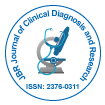Letter to Editor 天美传媒 Access
A Rare Cause of Lower Gastrointestinal Bleeding in a Woman: Jejunal Diverticula
Bahşi R1, Doğan Z2*, Taşer N1, Aktaş MN1 and Filik L21Department of Internal Medicine, Ankara Education and Research Hospital, Turkey
2Department of Gastroenterology, Ankara Education and Research Hospital, Turkey
- Corresponding Author:
- Doğan Z
Department of Gastroenterology
Ankara Education and Research Hospital
Altındağ, Ankara, Turkey
Tel: +90 312 5954273
Fax: +90 031 23633396
E-mail: doganzeynal@yahoo.com
Received date: January 23, 2014; Accepted date: February 22, 2014; Published date: February 27, 2014
Citation: Bahşi R, Doğan Z, Taşer N, Aktaş MN, Filik L (2014) A Rare Cause of Lower Gastrointestinal Bleeding in a Woman: Jejunal Diverticula. J Clin Diagn Res 2:105. doi:10.4172/jcdr.1000105
Copyright: © 2014 Bahşi R, et al. This is an open-access article distributed under the terms of the Creative Commons Attribution License, which permits unrestricted use, distribution, and reproduction in any medium, provided the original author and source are credited.
Visit for more related articles at JBR Journal of Clinical Diagnosis and Research
Keywords
Gastrointestinal bleeding; Jejunal diverticula
To the Editor
A 86-year-old female patient was admitted with melena. She suffered from atrial fibrillation and therefore was adviced to take coumadin for thromboemboli prophylaxis. She was hospitalized for gastrointestinal bleeding for 20 days. She had three bleeding episodes during this time. Her first two bleeding episodes are self remitting in a couple of days after coumadin was discontinued. Esophagogastroduodenoscopy and colonoscopy were done twice but failed to detect the bleeding origin. Discharge was planned with restart of coumadin. Unfortunately, she had a third gastrointestinal bleeding the day before discharge. Her third bleeding episode was severe. Her serum hemoglobin level declined to 6.7 gr/dl and 4 units of erythrocyte were transfused. Her general condition was deteriorated due to worsened arrythmia. Capsule endocopy, Tc99 labelled eryhtrocyte scintigraphy and angiography could not be performed due to technical issues. Therefore, small bowel series was performed after patient was stabilized. Two diverticuli in duodenum and 3 diverticula in jejunum segments were demonstrated. Coumadin was discontinued and acetylsalicilic acid 100 mg was started. She is under follow-up for a year and stable regarding to gastrointestinal and cardiac problems.
Small bowel diverticula are known mostly asymptomatic and autopsy studies report the incidence below 4.5% [1]. Gastrointestinal hemorrhage originating from small bowel diverticula is very rare [2]. Either persistent or recurrent GI hemorrhage without a cause detected on esophagogastroscopy and colonoscopy is usually challenging in daily practice. Tc99 labelled eryhtrocyte scintigraphy or angiography can be used for detecting bleeding diverticuli. Herein, we underline the importance of small bowel series for small bowel divericula. In conclusion, small bowel series should always be considered in whom gastrointestinal bleeding can not detect with both upper and lower digestion system endoscopy. Proper and timely diagnosis might be necessary and supportive measures can be enough in follow-up of those patients.
References
--Share This Article
Relevant Topics
- Back Pain Diagnosis
- Cardiovascular Diagnosis
- Clinical Diagnosis
- Clinical Echocardiography
- COPD Diagnosis
- Diabetes Diagnosis
- Diagnosis Methods
- Diagnosis of cancer
- Diagnosis of CNS
- Diagnosis of Diabetes
- Diagnostic Products
- Diagnostics Market Analysis
- Heart diagnosis
- Immuno Diagnosis
- Infertility Diagnosis
- Medical Diagnostic Tools
- Preimplementation Genetic Diagnosis
- Prenatal Diagnostics
- Ultrasonography
Recommended Journals
Article Tools
Article Usage
- Total views: 13439
- [From(publication date):
December-2014 - Jan 10, 2025] - Breakdown by view type
- HTML page views : 8979
- PDF downloads : 4460
